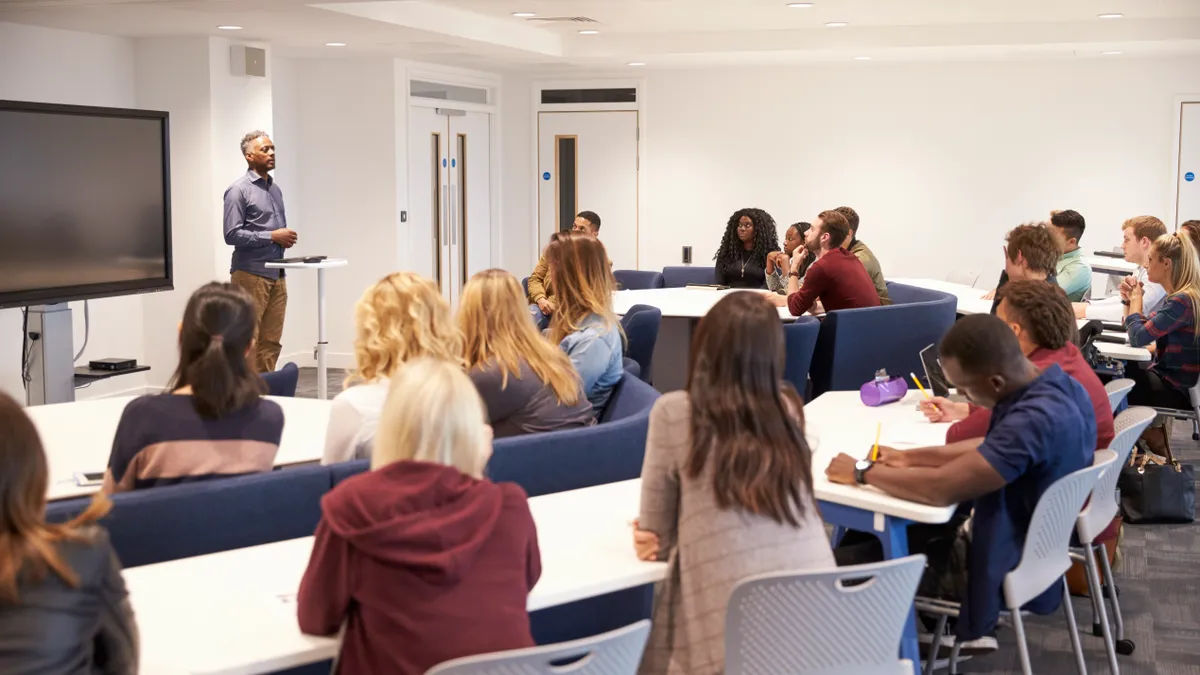Editor's Note: This piece was written by Monique Fuchs, associate vice president of innovation and entrepreneurship at the Wentworth Institute of Technology in Boston.
As educators, we constantly evaluate whether our programs and curricula prepare students sufficiently for the current and projected needs of industries. That fact has never been more true as new graduates face a fast-changing workforce and education is now preparing students for jobs that don’t even exist yet.
A crucial mix of subject matter expertise and critical experiential competencies will be necessary for new graduates to thrive. A recent survey from MindEdge found that 42 percent of U.S. managers anticipate automation will lead to job loss, and re-tooling talent and augmenting competencies and skills will be essential to position employees for the future job market. Thus, we must ask ourselves - are our universities and colleges preparing students with the right competencies for the future of work?
The workforce is evolving in an unprecedented manner
The answer to that question is: They are not.
The world is facing increasingly complex challenges today. From global warming to the opioid epidemic, companies and organizations are looking for solutions to multi-layered problems. This requires disciplines to cross boundaries in order to solve these issues together at the tension of each other’s disciplines. That convergence necessitates a different set of skills and competencies.
Because of this, industries are rethinking how they hire and develop talent at all levels. Companies need employees who are innovative thinkers, excellent problem solvers and resilient in the face of adversity. An evolving workplace means retooling employee skills and competencies and developing new ones. Companies are changing. Many are increasingly providing maker or ideation environments which are intentionally designed to foster co-creation and collaboration. They’re also integrating subject matter experts across disciplines who can work outside of their comfort zones from the onset of a project or developing products maximizing synergies and leading to greater innovation.
These changes at the industry level require transformations at the educational level. We must consider how education prepares the talent pipeline, creating the future leaders of these companies and the employees who will be subject to this culture of collaboration and converging disciplines.
Educators should stop working in disciplinary silos
The education industry still often embraces singular and often a linear focus on subjects and disciplines. This approach can have value, for example advancing a body of knowledge through research. But it can also create silos. It does not help to facilitate the development of important experiential competencies that students need. Disruption is necessary, as it’s where education becomes a collective sandbox: all disciplines are merged to solve real problems, with society or industry providing relevant topics and engaging actively with students. Here, students are focused on experiencing, making, in a sense, instead of just thinking.
We should be focusing on equipping students with experiential competencies, such as innovative thinking and entrepreneurial confidence. Concentration on these competencies allows students to experiment, ask questions, exercise grit and resourcefulness, take risks, and develop presence. Most importantly, they are learning to fail and persevere while solving real challenges and building ties early on to industry and their communities. These are currently being developed peripherally, but not always being developed intentionally.
Progress begins with a culture shift
Change can start today. Encourage students to engage outside of their discipline, in programs or extracurricular activities that exercise and cultivate these competencies. We can help students find the connection points between their area of study and others, both inside and outside of the college classroom. We can offer spaces where students examine systemic challenges and natural collision points where an engineering student and a business major can converge to solve those issues.
We should nurture a vibrant network of interesting projects, experts, and companies, where students can connect with industry leaders and absorb knowledge and insights. In a greater institutional sense, educators should push academic departments and faculty to also provide relevant challenges, create real world intersections, create learning opportunities across disciplines and actively engage the external world actively and meaningfully in course work.
Students need new competencies and skills. Those who exhibit competencies like innovative thinking and entrepreneurial confidence are not only the most employable in a competitive job market, but they are truly job-ready. We have a duty to revamp the education system to help our students become the movers and shakers who will take on organizational and institutional problems and provide creative solutions that help society as a whole.









